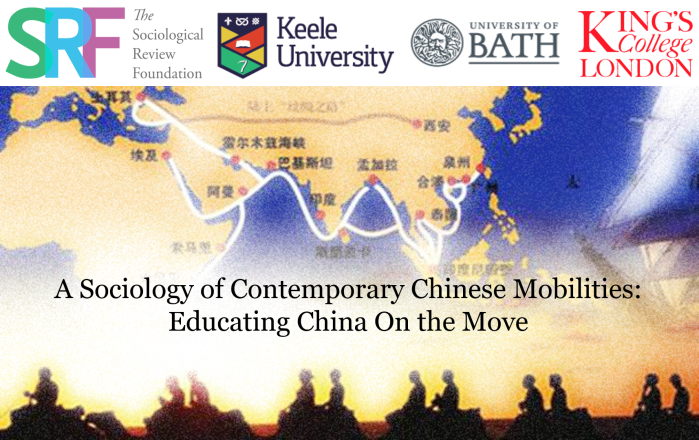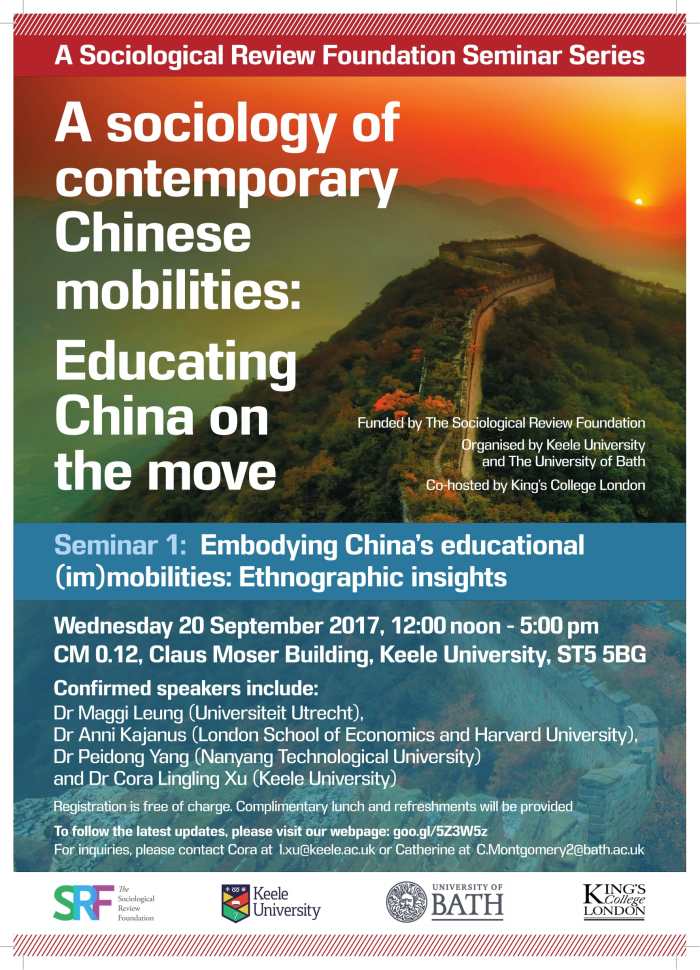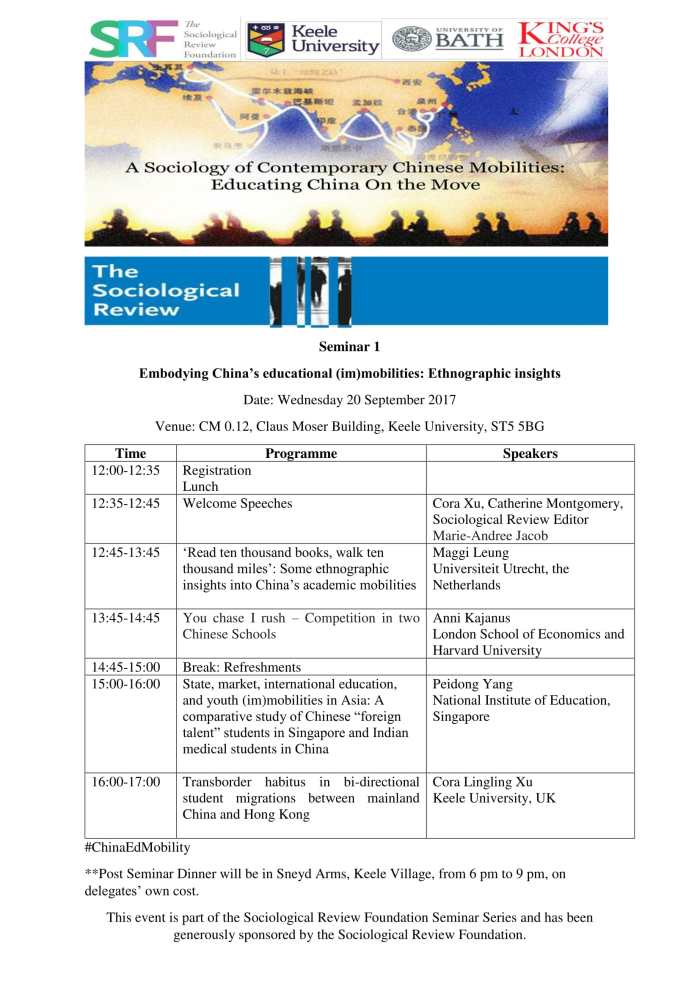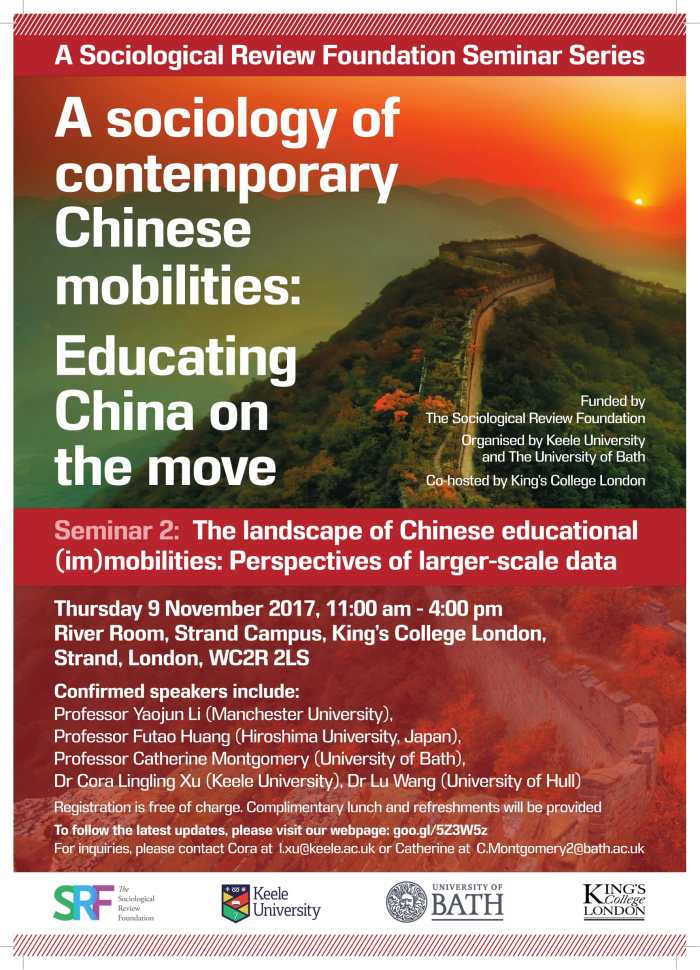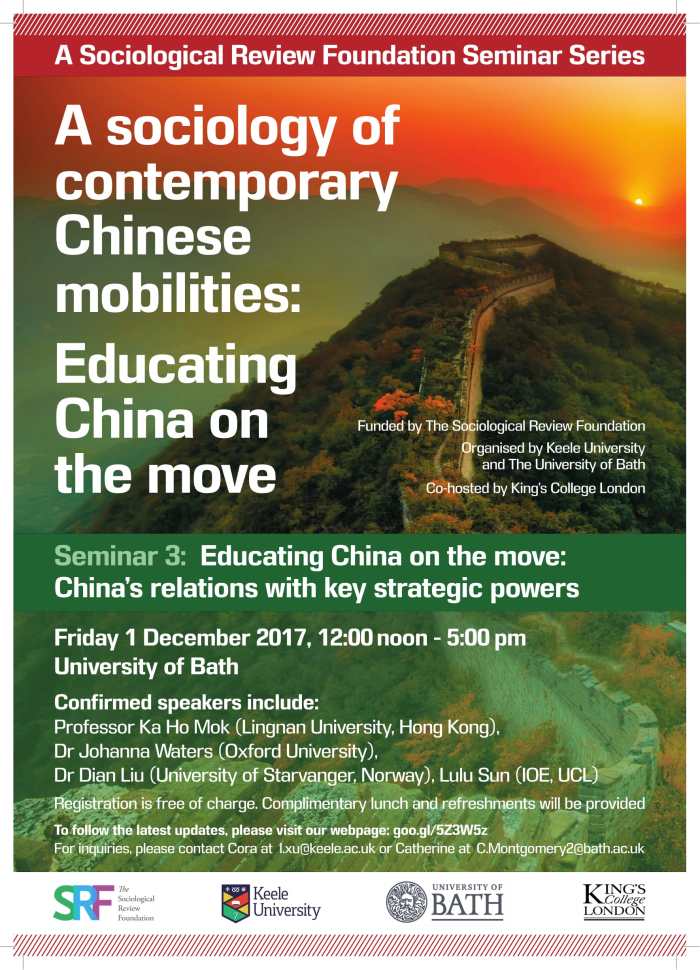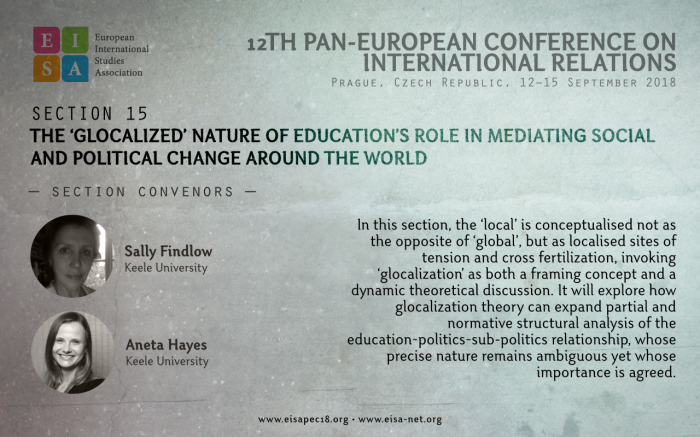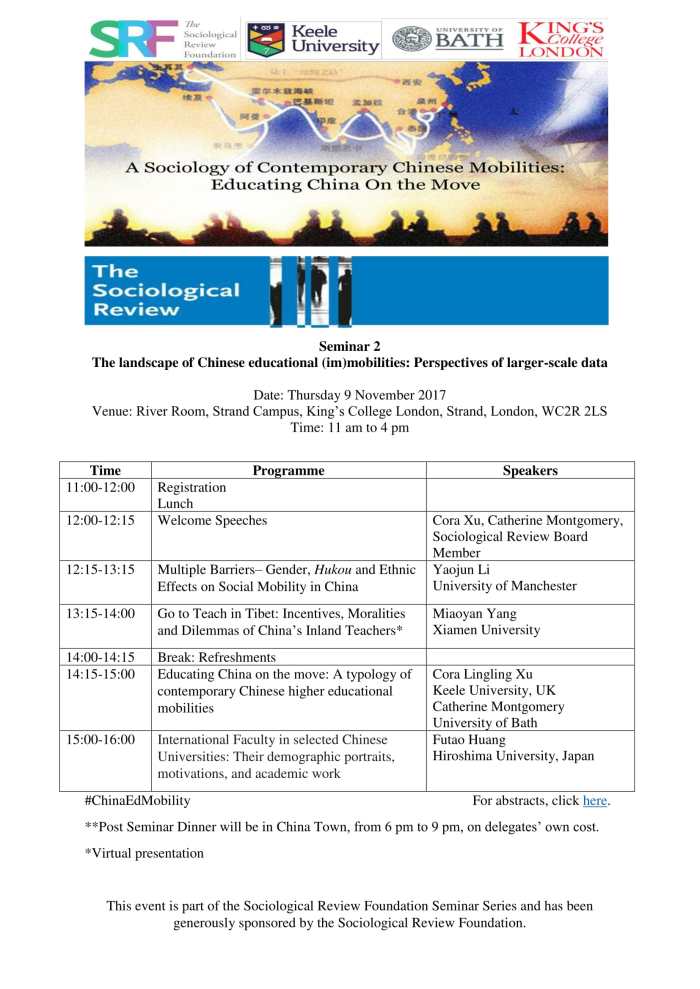These are abstracts for the Sociological Review Foundation Seminar Series 2017 on ‘A Sociology of Contemporary Chinese Mobilities: Educating China on the Move’.
Seminar 1: Embodying China’s educational (im)mobilities: Ethnographic insights
- ‘Read ten thousand books, walk ten thousand miles’: Some ethnographic insights into China’s academic mobilities
Maggi Leung, Universiteit Utrecht, the Netherlands
International movements of scientists and researchers, like those of students, have become more common in the increasingly interconnected global knowledge economy. Geographic mobility is often perceived as a key to academic excellence and career advancement by scholars. This echoes the essence of a famous Chinese proverb ‘Read ten thousand books, walk ten thousand miles’. My paper will illustrate the motivations for, experiences and impact of international academic mobility among Chinese scholars. It contextualizes scholars’ desires to study-/work-travel and their journeys within broader institutional, policy and discursive frameworks, which span places and geographical scales in China and the host contexts (in my research: places and institutions in the USA, Germany and the Netherlands). My analyses draw on a number of my qualitative research projects and tacit knowledge accumulated as an international student and academic staff in the last two some decades. The paper will conclude with reflections on the co-production of ethnographic insights in the field of migration/mobility. In particular, I put forth the notion of ‘spatial-temporal reach’ to make sense of the complex, dynamic, deeply situated and often unplannable relationalities between researchers and their research participants. Episodes from my journey as a ‘mobile scholar researcher’ illustrate how sensitivity to (socio-)spatialities (as in insiderness-outsiderness) and temporalities (such as age, generation, life cycle, time and frequency of research contact) help us, as researchers, reflect on our positionalities, experiences and emotions in knowledge co-production with the people whom we study – which in turn, shape our understanding of our own identities.
- You chase I rush – Competition in two Chinese Schools
Anni Kajanus, London School of Economics and Harvard University
Being in a competition of some kind has come to form a backdrop for everyday moral experiences and aspirations in China. The education system with its exam-based meritocracy and high disparity between institutions and regions epitomizes this spirit, and the growing inequalities behind it. Children work under high pressure to compete for access to the best educational tracks, which, it is hoped, will lead to socioeconomic mobility and secure future. While the impact of this competition on various aspects of the changing systems of sociality and morality has been debated extensively, a detailed discussion of competitiveness itself is lacking. What patterns of competitive behavior and motivation emerge in these educational environments? What does competition mean to the children themselves, and how are these meanings embedded in wider socio-moral processes?
Drawing from ethnographic and experimental material, I compare the competitive modes of children in an urban middle-class school and a semi-rural working-class school. I contest the common association of competitiveness with individualism, and opposition between competition and cooperation. Further, I discuss the implications of the different modes of competitiveness to children’s educational mobility and wellbeing.
- State, market, international education, and youth (im)mobilities in Asia: A comparative study of Chinese “foreign talent” students in Singapore and Indian medical students in China
Peidong Yang
National Institute of Education, Singapore
Peidong.yang@nie.edu.sg
Young people in today’s world are increasingly mobile geographically, and education is among the top reasons behind such a rise in youth mobility. While existing scholarship has mainly looked at educational mobilities involving Western destinations, this paper shifts the focus to Asia, in response to the rapidly evolving scene of educational mobility in this dynamic region. Specifically, this paper examines comparatively two cases of educational mobility that respectively involve students from China and India: (1) academically able youths from middle-class urban China recruited by Singapore as “foreign talent” scholars; and (2) academically less prepared Indian youths from lower-middle or working class backgrounds studying English-medium medical degrees (MBBS) in China.
In this paper, on top of unpacking the structural forces (mainly the state and the market) shaping and the conditions underlying both cases of mobility, I present various dimensions of the lived experiences of these two groups of mobile Asian youths. My account seeks to uncover the immobilities and frictions hidden within projects of educational mobility. I also highlight and contrast the differential access to mobility and the differentiated outcomes of mobility between the Chinese and Indian youths. It is argued that, accompanying the widening access to educational mobility in Asia, and probably elsewhere too, is a process of class-differentiation within this mobility field.
- Transborder habitus in bi-directional student migrations between mainland China and Hong Kong
Cora Lingling Xu
Keele University, UK
Over the past two decades, bi-directional cross-border student migrations between mainland China and Hong Kong have been on the rise. However, little is known about the lived experiences of such border-crossing individuals amid an increasingly tension-riven cross-border socio-political dynamic. Even less has been done to compare how students across both sides of the Hong Kong-mainland China border navigate their relative positioning when studying in the respective ‘other side’ higher education institutions. In this paper, I draw on ethnographic data from two parallel projects to explore the higher education trajectories of two groups of students, i.e. those from mainland China (n=31) studying in Hong Kong universities and those from Hong Kong (n=30) pursing degrees in mainland Chinese universities. Based on Pierre Bourdieu’s notions of field, capital and habitus, I examine the ‘transborder habitus’ of these two groups of students, particularly on how various social, cultural and political resources are differentially evaluated across the within-country border. This paper highlights inequalities operating at individual, institutional and state levels in such bi-directional student migrations.
Seminar 2: The landscape of Chinese educational (im)mobilities: Perspectives of larger-scale data
- Multiple Barriers– Gender, Hukou and Ethnic Effects on Social Mobility in China
Professor Yaojun Li
Department of Sociology and Cathie Marsh Institute for Social Research,
School of Social Sciences, University of Manchester, M13 9PL Yaojun.Li@manchester.ac.uk
For over half a century, social mobility in China has been hampered by the interplay of the household registration system (hukou), ethnic inequality and patriarchal ideology over and above the family origin effects. Have these influences have weakened during the reform ear or have they persisted or even strengthened? What are the patterns and trends of social mobility like in China? How important are gender, ethnic, hukou and family origin effects on people’s educational and occupational attainment?
This study aims to answer these questions by conducting a comprehensive analysis of social mobility in China focusing on parental class, gender, hukou and ethnic differences in people’s educational and occupational attainment in the last two decades. Using nine large-scale national representative social surveys between 1996 and 2014, the analysis shows that a small degree of social fluidity was visible but there were marked class, hukou and gender inequalities in education. In terms of occupational attainment, a largely similar profile obtains but with one important exception, namely, that ethnic minority women from higher family backgrounds outperformed all other groups in gaining access to the professional-managerial (salariat) positions. By contrast, ethnic minority women from peasant families were the least likely to find themselves in the salariat. Overall, class origin effects prove more resistant to change than do those associated with gender, ethnicity and hukou status when it comes to social mobility.
- International Faculty in selected Chinese Universities: Their demographic portraits, motivations, and academic work
Professor Futao Huang
Professor at the Research Institute for Higher Education
Hiroshima University, Japan
E-mail: futao@hiroshima-u.ac.jp
The purpose of this study is to explore main characteristics of international faculty being hired in Chinese leading universities, their motivations, academic work, especially the role they play. By analyzing their personal, educational, and professional profiles which are publicly available, results of four case studies in different parts of China, as well as main points from interviews with international faculty and academic and administrative staff in their institutions, the study presents the following findings: In terms of their demographic profiles, a huge majority of international faculty are male, doctoral holders, professors from engineering and natural science. A vast majority of them are citizens of the USA and obtained their doctoral degrees in the USA, the UK, Hong Kong, and other European countries, but nearly 90 percent of them used to be citizens of People’s Republic of China and earned their bachelor’s degrees in mainland China prior to their going abroad. As most of them are hired in Chinese leading universities based on national-level projects like One Hundred Talents Project, they are treated differently with their Chinese colleagues. In most cases, they are provided with an additional financial support and enjoy more favorable research and work conditions. In relation to their motivations of coming to Chinese leading universities, they mainly include better salaries, research funding and favorable working condition, possible self-actualization, and willingness to making contribution to their home universities and mainland China. Regarding the roles they play, despite differences between various universities, a majority of them concentrate on research activities, primarily undertaking national-level or even internationally collaborative research projects, publishing in indexed journals. Some of them are also expected to incorporate international dimension and content into university-wide curriculum and their courses, especially at doctoral education level, to build research capacity and level of their belonging universities or faculties, to form and expand international academic networking with international partners, and to produce and train young academics or doctoral students to be internationally recognized scholars. The study concludes that only Push & Pull factors of immigration are not sufficient to explain why international faculty are hired in Chinese leading universities, Maslow’s hierarchy of needs, Social Capital and Social Networks, World-Systems Theory, and theory of Globalization should also be taken into consideration in this regard. Furthermore, as international faculty working in Chinese leading universities provide examples of new forms of international mobility of the academy, it is likely that Chinese strategy and practice of attracting international or global talents are of relevance and interest to other emerging countries in relation to internationalization.
- Educating China on the move: A typology of contemporary Chinese higher educational mobilities
Cora Lingling Xu and Professor Catherine Montgomery
As China’s economic power grows against a context of global uncertainty, it has become increasingly important to develop a nuanced understanding of Chinese globalisation, not least for its significance to the balance of power relations within and beyond East Asia. The previously dominant global hierarchy which mapped countries into geographic imaginaries of dominance and subservience is being disrupted and the competing ideologies of ‘the west is dominant’ against the potential of global pluralism are again coming to the fore. Higher education is an integral part of this and provides a powerful lens through which to view China’s developing global reach and its changing global relations and this is manifested in its many established and newer forms of educational mobilities. China is actively encouraging these mobilities and opening up its higher education market to the world. This paper proposes a typology which systematically analyses the complexities of contemporary Chinese higher educational mobilities, encompassing within-China, outbound and inbound mobilities. This typology reveals that while inbound and outbound mobilities are testament to the growing power and influence of China, mobilities are also deeply fraught with inequalities. When combined with the internal educational mobilities of China, the typology also highlights the persistent disadvantages experienced by marginalised groups, such as those from rural, working-class and ethnic minority backgrounds. It is suggested that unless these persistent inequalities are addressed, China and perhaps other emerging superpowers such as Brazil, India and South Africa, will struggle to challenge traditional global hierarchies.
- Go to Teach in Tibet: Incentives, Moralities and Dilemmas of China’s Inland TeachersMiaoyan Yang Xiamen University
As one of China’s least developed lands, Tibet is of high concern in the state’s civilizing agenda. Geographic remoteness, high altitude, and lack of oxygen, nevertheless, have posed great challenges to this civilizing effort. In order to promote national integration and educational development in Tibet, the state has gradually developed a comprehensive “Educational Aid for Tibet” program, to either recruit Tibetan students to receive secondary education in inland schools, or to dispatch inland teachers to teach in Tibet schools over the past 30 years. Since 2016, a “Educational Aid for Tibet in Groups” plan (组团式教育援藏) has been initiated, which the state considers as an important political task and a critical move to “Gathering Support of Civilians” (聚民心). Every year, 800 teachers from key primary or secondary schools in 17 inland provinces (municipalities) are to teach in 20 Tibet schools for a short rotation varying from one to three years. Through this act, the state aims to significantly improve educational quality of certain local key schools in Tibet and expand its aid effect. Situated in the current educational aid for Tibet context, this study examines the incentives, moralities and dilemmas of Inland teachers teaching in Tibet schools. Document analyses, interviews with Tibet and inland teachers and school observations suggest two parallel lines of logic in their going to teach in Tibet decision-making: the pragmatic and the moral, both of which have confronted dilemmas when they were actually teaching in Tibet.
Seminar 3: Educating China on the move: China’s relations with key strategic powers
- Is internationalization of higher education dead in a ‘post-truth’ age? Critical Reflections of International Learning, Job Searches and Social Mobility in China
Professor Ka Ho Mok
Vice President and Lam Man Tsan Chair Professor of Comparative Policy
Lingnan University, Hong Kong
While higher education continues to drive an outward looking, globally connected agenda, recent democratic elections taken place in the UK, Europe and North America could suggest that the voting public are placing more value on isolationism. Increasing concerns have emerged criticizing the internalization of higher education for intensifying social and educational inequalities, favouring the rich but marginalizing the poor. This paper sets against the wider context briefly outlined above to critically examine how Chinese students completing their university education in the UK or graduating from UK universities operated in China mainland evaluate their learning and job search experiences. This paper is based upon fieldwork conducted in China, with particular reference to university graduates’ reflections of how their international learning has enhanced their job searches and upward social mobility. This paper critically reflects on how the Chinese case would connect to the most recent debates of anti-globalism emerging across different parts of the world, especially when people begin to question the negative impacts of international education.
- Education as Aspiration: The example of China with/in Africa
Johanna L. Waters, University of Oxford
In this paper, I explore the changing spatialities of international higher education, with specific emphasis on the implications of this for south-south relations. In particular, the paper considers the notion that educational exchanges and involvements, which by-pass ‘traditional’ north-south colonial/post-colonial routes, offer an alternative (and welcome?) path for contemporary geographies of international higher education. The paper will consider whether this alternative perspective necessarily aligns with views expressed in recent work on postcolonial educational responsibility. The empirical focus of the paper is China – an emerging power when it comes to education as well as commerce. Especially intriguing is the way in which China frames its growing involvement in education within Africa as ‘south-south cooperation’, as a ‘win-win’ situation for both parties and it terms of aspirational goals (rather than the provision of ‘basic needs’). The paper considers the nascent academic literature on China’s involvement with education in Africa, before suggesting an agenda for future research in this area.
- Employability and mobility in cross-culture academic job search: the experiences and reflections of early-stage Chinese researchers
Dian Liu, University of Stavanger
The past two decades have witnessed the deepened internationalization process in higher education, leading to growing academic mobility in terms of postgraduate cultivation, and staff and student exchange across cultures, and China is of no exception. During the past 30 years, China has outputted a considerable number of graduates continuing the post-graduate study overseas, and a large portion of such population would prefer to stay aboard or at least gain some overseas working experiences upon their graduation. Nevertheless, in a competitive global labour market, job seekers experience more difficulties and hidden obstacles than those in a domestic labour market. Moreover, the employability as required in overseas job mobility also has wider references. This article examines the employability and mobility in a global labour market by targeting on a specific group of job seekers, the PhD graduates as early-stage researchers looking for academic jobs in the host countries. Following the ethnographic approach, this article traces back the job search process of 8 Chinese PhD graduates in Europe during the year 2016-2017, analyses the inequalities in an overseas academic labour market justified by regional economic crisis, and examines how these young researchers reflect upon their employment process.
- Chinese University Faculty in International Academic Mobility-Case studies of four universities in China
Lulu Sun
Institute of Education, University College London, Lulu.Sun.15@ucl.ac.uk
International academic mobility (IAM) is the most frequently addressed issue in the discourse of internationalisation. Main data and research covers international student mobility, however, the mobility of academics, which are active in higher education, have been given less limelight. In this case, the study investigates the international mobility experiences of Chinese university faculty. Case studies of four different types of universities were carried out in mainland China during Nov. 2016-Mar.2017. A mixed-method is used to collect both quantitative and qualitative data. Quantitative data collected from more than 500 web-based questionnaires and figures supplied by China Scholarship Council, together with interview data from more than 50 individual faculties and a purposive sample of 10 university leaders, are examined. Findings are expected to indicate what motivates university faculty to involve in long-term (3 months minimum) IAM, the impact of mobility experience brings towards faculty’s career progression and on the home institutions and to what extent the impact is. It is hoped the study will be helpful to give a much better base of IAM and provide a view for Chinese universities, policy practitioners and policy makers in the relative areas.
